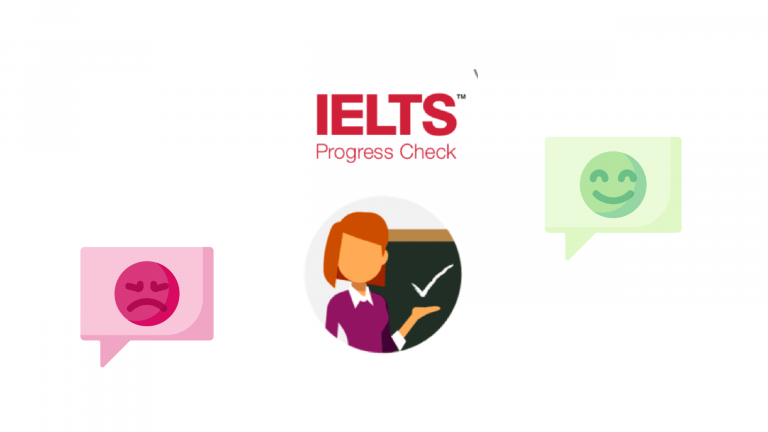
IELTS Progress Check: A Review
IELTS Progress Check: A Review
A number of students have asked recently what we think about the new IELTS Progress Check. This is a relatively new service that offers students the chance to complete a full mock test in exam conditions that is marked by a trained examiner. The marketing for the service says that you will receive “an official feedback report, which includes an indicative overall test band score as well as a band score for each section of the test”, plus you will “receive personalised feedback chosen by the IELTS markers on all assessment criteria in your Speaking and Writing tests.”
But, how does the service work and how detailed is the feedback that you will receive from your IELTS Progress Check? This week, one of our listeners was kind enough to share their official feedback report, so Nick and I answer those questions and much more in today’s episode.
This is a Patron Only Episode: Click here to support the show and gain access to the audio

https://www.patreon.com/myieltsclassroom
Below, you can find a summary of the episode, which includes all of the links to useful materials and the times of each part of the discussion (so you can go directly to the part you want to listen to) 🚀
Subscribe to My IELTS Classroom podcast on Apple podcasts here
Subscribe to My IELTS Classroom on Google podcasts here
What is the IELTS Progress Check?
The IELTS Progress Check offers you the chance to complete a full IELTS test online, which will then be sent to official IELTS markers to be corrected. Just like the real exam you will be asked to complete four sections (listening, reading, writing and speaking) and you have the option of choosing between the General Training and Academic versions of the IELTS test. However, there are some other differences you should consider before booking your IELTS Progress Check:
- Unlike the real exam, the speaking in the IELTS Progress Check happens online using a recorded voice. In other words, you will not connect with a live examiner in a Zoom room (as happens in IELTS Indicator or, sometimes, in the real exam) but you will simply listen to a recorded question and then answer it directly to the computer. Your voice will be listened to by an examiner at a later time. This is obviously very different to the real test and, in my opinion, does not replicate the real exam in any way. Nick and I will discuss this further in the episode.
- Unlike the real exam, you can choose to have a timed or untimed version of the exam. If you choose “timed” then you will be given a time limit for each section, just like in the real exam. However, if you choose “untimed”, you will take the test without a timer, so you can complete each part at your own pace.
Currently, there are 4 different versions of each test available for purchase. You can choose which you would like at checkout. Sadly, there is no information about what exactly each test contains, so you cannot, for example, choose a test with a particular type of essay question or topic. Instead, you can just choose “Practice Test 1” or “Practice Test 2”. One test costs $49.99 but you can get a 15% discount on a second test if you purchase two at the same time.
Be careful if you are purchasing more than one IELTS Progress Check – the system allows you to purchase a test more than once, so make sure you select a new test each time!
You will have 90 days to complete the test from the date of purchase and, once submitted, you will receive your official feedback report within 5 days.
How is IELTS Progress Check different to IELTS Indicator?
Good question! In many respects, they are the same – you will complete all four sections of the test and get a genuine score. However, IELTS indicator is taken under secure conditions, so you will not be able to “cheat” by using a dictionary or having another person in the room to help you.
Also, as I mentioned before, the speaking section of the IELTS Progress Check is NOT completed with a live examiner. Instead, you will simplyhear a recording of the examiner’s voice asking you the questions to which you will respond.
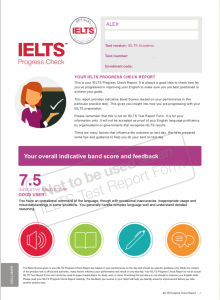
Finally, IELTS Indicator was created in order to give potential students a way to prove their level of English to universities when face-to-face exams were not possible because of COVID19. Although the results of an Indicator test CANNOT be submitted as proof of English in a visa application, they can be submitted to university admissions boards. IELTS Progress Check, in contrast, has no practical purpose – it is designed to simply be a guide to your current indicative score.
How detailed is the feedback given when you take an IELTS Progress Check?
I am going to be brutally honest from the start and say “not very”. Although you can be confident that the band scores that you receive are genuine and accurate, the feedback that you get from the IELTS Progress Test is very basic. Almost everything is just copy and paste generic comments taken from the band descriptors and there is almost no personalised analysis of your performance at all.
In fact, from my perspective, there is shockingly little. If I had paid $49.99 to find out my current level, and to
receive personalised feedback chosen by the IELTS markers on all assessment criteria in your Speaking and Writing tests
then I would be expecting a lot more than was in the “report” which was shared with me by one of our listeners. Let’s look at the sample I have of the feedback report to show you what I mean.
IELTS Progress Check feedback for Listening and Reading
Let me copy and paste some of the information that my student, Alex received following his listening test:
7.5
INDICATIVE BAND SCORE
GOOD USER
You have an operational command of the language, though with occasional inaccuracies, inappropriate usage and misunderstandings in some situations. You generally handle complex language well and understand detailed reasoning.
You can follow extended speech and understand detailed instructions to complete tasks, including some involving complex ideas. You can identify ideas, attitudes, opinions or purposes which are implied by the speaker but not directly stated.
As you can see, all of the information about the student’s listening ability has been copied and pasted from the IELTS band descriptors. There is absolutely no analysis of the student’s actual test paper, and no feedback that is specific to their performance.
I was expecting at least some reference to particular questions that the student got wrong i.e. some comments that the student seems to struggle with multiple choice questions or those that ask to discern an opinion. However, there is absolutely nothing.

Plus, just like when you receive the results of the real test, there is no record of which specific questions the student answered correctly or incorrectly, or what the actual answers are. This means that the student still has no idea which part of the test they are losing marks in, or how to improve further. In other words, the student would benefit far more from completing a test in the Cambridge books, as they would be able to see the answers, read the tape-script, and analyse their performance. Worse, the IELTS Progress Check then provides some “listening tips”. Here is one:
LISTENING TIPS
- At the beginning of each section read the questions for that section carefully, before the recording starts. This will help you to follow the recording and identify the answers.
The other four pieces of advice are similar and, quite honestly, shockingly basic. It is the type of advice that I would give to a student on Day One of an IELTS course not to a student who is sitting at a 7.5 and needs an 8.0. Again, this is all copy and paste and has no connection at all to the student’s actual performance, so it is hard to see its value.
Just when I thought that the feedback couldn’t get any more vague, there is then a box titled “How to Improve”
HOW TO IMPROVE
Listen to current affairs and documentary programmes, or online talks, without pausing or repeating the recording. Try to remember as much as you can, including new words, main ideas, specific points, and their relationship to each other. Afterward, reconstruct what you’ve heard. How much are you able to reconstruct? Listen more and try to increase the amount that you can reconstruct.
There are so many things that a student can do to improve their specific IELTS listening scores, so advising to simply “listen to current affairs programmes” (with no suggestion as to what they are) and “reconstruct them” is disappointing.
The feedback for reading is exactly the same – you get a score, a list of copy and paste comments about what that score means, some basic reading tips that are of no use to anybody who has spent more than a day preparing for the exam (The Reading passages always contain the information you need to answer the question. You won’t have to use your own knowledge of a topic.) and a box of “how to improve” (which I cannot share as my student got a 9.0). In other words, the only useful piece of information that the student receives is their overall score, but just like the real exam they have no idea why they received it.
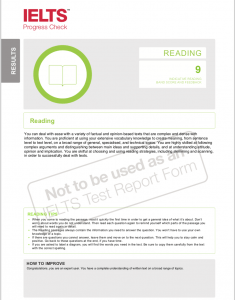
IELTS Progress Check feedback for Writing and Speaking
What about writing and speaking? Well, they are more or less the same, but there is some LIMITED personal feedback this time. The feedback for writing is split into Task One and Task Two. Just like for reading and listening, each student is given a band score (in Alex’s case 7.0) and the initial feedback consists of just copy and paste comments from the band descriptors:
- WRITING: TASK ONE – TASK ACHIEVEMENT (25%) You address part of the task. There may be too much detail, no overview, or no data. There might be irrelevance and inaccuracy.
- WRITING: TASK ONE – COHERENCE AND COHESION (25%) Your writing is coherent and cohesive. You can sequence your ideas logically, and link them all well together. You manage paragraphing well.
- WRITING: TASK ONE – LEXICAL RESOURCE (25%) You can flexibly use a range of vocabulary and some less common words with some style, despite occasionally choosing the wrong word or making mistakes in spelling or in the form of a word.
- WRITING: TASK ONE – GRAMMATICAL RANGE AND ACCURACY (25%) You are able to use a variety of complex sentences, and many of your sentences are correct. However you still make a few mistakes with grammar and punctuation.
You can actually use these comments to identify Alex’s score by matching the to the public band descriptors (which shows that Alex had problems with Task Achievement – probably a 6.0) but was very strong in Coherence and Cohesion (probably an 8.0), but not every student will be able to interpret the band descriptions easily.
This time there is a small box with 5 pieces of individual feedback that has come directly from the examiner:
MARKER FEEDBACK
- You make errors with articles (a, an, the)
- You make errors with prepositions (for, at, on, to)
- Make sure to include a clear overview of main trends and features
- Make sure to use data to support your description
- You have used some less common words and spelling is generally accurate
However, although I assume that this feedback is specific to the student as the first two points seem targeted, points 3 – 5 are again very generic. With no examples or explanation of any of the comments, it is hard to know where exactly the student went wrong. What, for example, was unclear about the overview? And where was the missing data? (This comment confuses me as my students always use data to support their trends).
Want to know how the examiner will apply the band descriptors when marking your IELTS essay?
Then download a copy of our FREE e-book, which explains how each of the four marking criteria is applied and includes the most common errors made by test-takers. Just click here for your copy.
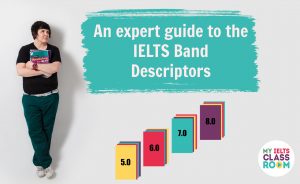
Obviously, this is better than the feedback for reading and listening as it is personalised, but with no examples or corrections, there is almost nothing here that the student could use to understand their score or improve further. Plus, once again, “How to Improve” box is full of generic advise that is of no use at all to a student who is looking for specific ways to improve their score.
HOW TO IMPROVE
Practise producing different types of writing. When writing informational and argumentative pieces, take care to develop your points thoroughly, providing as many relevant supporting ideas and details as necessary. Don’t develop your points separately. Instead, ask yourself: how might I develop my idea so that it logically leads me to my next idea? Then, also ask yourself: does my use of paragraphing help to highlight the flow of my ideas? Have I also used other means besides paragraphing to do this?
Again, this advice is not bad, but it is the type of general advice that I would give to a teacher about how to help students pass the exam. There is no consideration at all of the student’s actual writing script and no reference to their particular errors, so it is hard to see how this “advice” could be meaningfully used to improve a score.
The format for the Writing Task Two and Speaking feedback is exactly the same – cut and paste comments from each of the band descriptors for initial feedback and then five short pieces of personalised “marker feedback”.
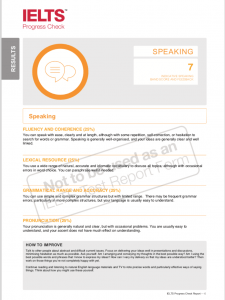
Should you purchase the IELTS Progress Check?
Honestly, I am going to say that it is probably not a good option for most students. The service is expensive and all you are receiving for $49.99 are 4 accurate band scores. However, if you have copies of the Cambridge books, you can get accurate scores for your listening and reading there, and there are many trustworthy services that can give you more detailed feedback for writing and speaking for a much lower price.
More importantly, those services should also give you clear personalised detailed feedback about your performance and advice about how to improve.
I would say that the only group who could benefit from the IELTS Progress Check are people who have been preparing at a local school with no experienced IELTS teachers and would like to find out what their current scores are for writing and speaking, or students who have exhausted the Cambridge series and want a chance to practice with a new reading and listening exam.
However, if you are stuck at a 6.5 or want to know exactly WHY you are achieving your current score, the IELTS Progress test is not really the tool for you as you get no personal feedback whatsoever.
IELTS Progress Check: A Review
The IELTS Progress test gives you a chance to take a full mock-exam under exam conditions (if you choose the “timed” version) and will definitely provide you with an overall indicative band and 4 accurate individual band scores. However, despite the description on the official website, the feedback that you get from the exam is minimal, with almost everything being just copied and pasted from the band descriptors and no genuine “breakdown” of your performance.
Who should sit the test
- A first-time test-taker who has prepared at a local school (which does not have any ex-examiners or a proven record for coaching IELTS candidates) and who wants to know their current writing and speaking scores (although there are MUCH better ways to find this out)
- A person who has finished all of the Cambridge books and doesn’t mind spending $49.99 for one more test
Who should NOT sit the test:
- A person who still has a number of Cambridge tests left and just wants to practice in test conditions.
- A person who has already taken the test and wants to know why they are stuck at a 6.5 in writing and speaking
